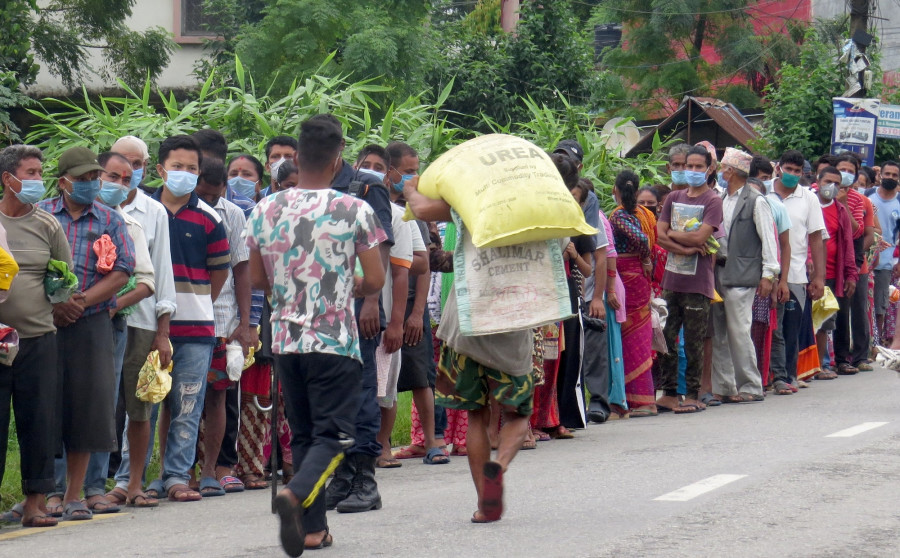Money
Nepal revives talks for chemical fertiliser offtake agreement with India
The deal will eliminate recurring shortages during the peak growing season, officials say.
Sangam Prasain
Nepal has revived talks for a chemical fertiliser offtake agreement with India under which it will buy a fixed amount of plant nourishers from the southern neighbour over a long term period to avoid recurring shortages during the peak growing season. The accord will be secured through a government-to-government deal, officials said.
Chemical fertiliser has become a political commodity, and Nepali farmers have been plagued by regular shortages when they need it the most, severely slashing their income and hitting the country’s economic growth which largely depends on agriculture.
Shree Ram Ghimire, spokesperson for the Ministry of Agriculture and Livestock Development, told the Post that talks had started with India, with the first round being held on Wednesday. “But the discussions are at a preliminary stage,” he said.
According to Ghimire, the government is planning a long-term contract with the southern neighbour for its chemical fertiliser needs. “The agreement will be based on Nepal’s requirement.”
He said that if the shipments imported through the regular procurement process fell short of the requirement, additional quantities of fertiliser would be obtained through the government-to-government deal.
It normally takes six months to procure chemical fertiliser following a global tender call under the Public Procurement Act. And in case the procurement is cancelled due to price volatility or other factors, there will be havoc in the farm sector.
“The new arrangement made through a government-to-government deal is not required to go through a lengthy procurement process, and it will ensure that farmers have adequate supply during times of shortages,” according to ministry officials.
In 2009, in a bid to end the perennial shortages, Nepal signed an agreement with India for 100,000 tonnes of chemical fertiliser (60,000 tonnes of urea and 40,000 tonnes of DAP) annually at import parity prices. The pact allowed Nepal to purchase fertiliser directly without going through the six-month-long tendering process.
Shipments came to a stop in 2015-16 due to protests in Tarai and an Indian blockade, and the agreement too expired at the end of 2017.
In 2018, Nepal had proposed to renew the agreement to procure chemical fertiliser for at least five years at import parity prices.
The proposal was in line with the 10-year Prime Minister Agriculture Modernisation Project introduced in 2017 which aims to boost farm output substantially.
The Agriculture Ministry had proposed importing 150,000 tonnes of fertiliser (100,000 tonnes of urea and 50,000 tonnes of potash) in the first year, that is 2018.
The ministry had planned to import 170,000 tonnes in the second year under a government-to-government deal, 195,000 tonnes in the third year and 210,000 tonnes each in the fourth and fifth years.
The expected government-to-government pact has been pending since December 2018, when Nepal submitted the first draft of the proposed memorandum of understanding.
According to a former secretary at the Agriculture Ministry, they had sent the proposal and several rounds of discussions were held. But India refused to provide chemical fertilisers at the import parity price.
“India told us clearly that it couldn't supply the product at the import parity price, and that it could not give the same treatment to Nepal that it gave to its farmers,” the official said.
The matter made no further progress. “Since it would have been expensive for Nepal to buy fertilisers from India at the export parity price, talks on a long-term agreement did not move ahead,” the former secretary said.
India also imports over 10 million tonnes of chemical fertiliser annually.
After the border was tightened due to the Covid-19 pandemic, Nepali farmers became frantic as smuggled fertiliser stopped coming, revealing how heavily dependent they are on imports from India.
A study conducted by the Finance Ministry in 2006 put the share of informal fertiliser imports at 71 percent of total supplies. Private companies in Nepal are reluctant to trade in fertiliser due to the high cost and risks, and all imports and distribution are conducted by Agriculture Inputs Company and Salt Trading, both state-owned enterprises.
Various parliamentary committees have instructed the government to set up plants to produce chemical fertiliser in Nepal, but feasibility studies carried out by the Investment Board Nepal have shown that domestic demand is too small to achieve economies of scale, making them unviable.
Experts and former officials have persistently argued that Nepal needs to explore more options to ensure timely supply of fertilisers.
According to another former agriculture secretary, the best way to end the constant shortage of chemical fertiliser in Nepal is to sign a commercial agreement with India, just like it does to import Indian oil.
According to the Agriculture Ministry, Nepal's annual requirement of chemical fertiliser stands at more than 700,000 tonnes while imports amount to around 300,000 tonnes. Demand for chemical fertiliser has shot up following the spread of commercial agriculture.




 8.54°C Kathmandu
8.54°C Kathmandu














